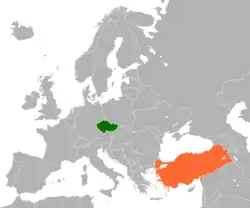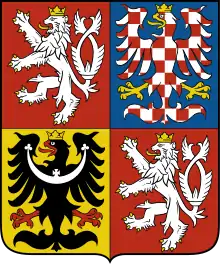Czech Republic–Turkey relations
Czech Republic–Turkey relations (Czech: Česko-turecké vztahy; Turkish: Çek Cumhuriyeti-Türkiye ilişkileri) are foreign relations between Czech Republic and Turkey.
 | |
Czech Republic |
Turkey |
|---|---|
In 1993, Turkey formally recognized both the Slovakia and Czech Republic as separate, sovereign states.[1] Diplomatic relations and the Turkish Embassy in Prague were established on January 4, 1993.[1]
Diplomatic relations
Relations between Czechoslovakia and the Turkey had been excellent until 1948,[2] when relations rapidly deteriorated[2] because of disagreements over the compensation[3] for the nationalization[2] of the property owned by Turkish businesses.
Trade relations were modest but limited because of Turkey's refusal[4] to participate in a trade agreement[3] until the claims[5] of nationalized businesses were settled.
Relations were also tense because of Czechoslovakia's alignment against Israel[6] in the Middle East, which was Turkey’s closest ally[4] in the region.
In 1993, Turkey formally recognized both the Slovak Republic and the Czech Republic as separate, sovereign states.[1] Diplomatic relations and the Turkish Embassy in Bratislava were established on January 4, 1993.[1]
Czech Republic and Turkey have strong diplomatic ties and cooperate in the military and law enforcement areas since Czech Republic joined the NATO Alliance.[7]
Country comparison
| Flag |  |
 |
| State Emblem / National Emblem |  |
 |
| Population | 10,693,939 | 83,154,997 |
| Area | 78,866 km2 (30,450 sq mi) | 783,356 km2 (302,455 sq mi) |
| Population density | 134/km2 (347.1/sq mi) | 105/km2 (271.9/sq mi) |
| Capital | Prague | Ankara |
| Government | Unitary parliamentary constitutional republic | Unitary presidential constitutional republic |
| Current Leader | President Miloš Zeman Prime Minister Andrej Babiš |
President Recep Tayyip Erdoğan Vice President Fuat Oktay |
| Official languages | Czech | Turkish |
| Main religions | 44.7% Undeclared, 34.5% No religion, 12.6% Christianity | 97.6% Islam, 1.1% Judaism, 0.3% Christianity |
| Ethnic groups | 64.3% Czechs, 25.3% Unspecified | 85% Turkish, 9% Kurdish 6% Others |
| Human Development Index (HDI) | 0.891 (high)[8] — 26th | 0.806 (very high)[8] — 59th |
| GDP (PPP) | $432.346 billion ($40,585 per capita) | $2.464 trillion ($29,326 per capita) |
Presidential visits
| Guest | Host | Place of visit | Date of visit |
|---|---|---|---|
| Presidential Complex, Ankara | September 2–4, 2018[9] | ||
Economic relations
See also
- Foreign relations of Czech Republic
- Foreign relations of Turkey
References
- "Relations between Turkey and Slovakia". Ministry of Foreign Affairs of Turkey.
- Bradley, J.F.N. Czechoslovakia: A Short History. Edinburgh: University Press, 1971.
- Kosta, Jin. Neue Reformansätze im Wirtschaftssystem der CSSR. (Berichte des Bundesinstituts fur ostwissenschaftliche und internationale Studien, 21-1985.) Cologne: Bundesinstitut fur ostwissenschaftliche und internationale Studien, 1985.
- Lettrich, Jozef. History of Modern Slovakia. Toronto: Slovak Research and Studies Center, 1985.
- Glos, George E. "The Legal System of Czechoslovakia." Pages 83-116 in Kenneth Robert Redden (ed.), Modern Legal Systems Cyclopedia. Buffalo: William S. Hein, 1985.
- Kusin, Vladimir V. " Gorbachev and Eastern Europe," Problems of Communism, 35, January–February 1986, pp. 39-53.
- "Relations between Turkey and Czech Republic". Ministry of Foreign Affairs of Turkey.
- "2019 Human Development Index Ranking | Human Development Reports". hdr.undp.org. Retrieved 2020-08-04.
- "Relations between Turkey and Czech Republic". Ministry of Foreign Affairs of Turkey.
Further reading
- "Additional Reportage on National Elections," Foreign Broadcast Information Service, Daily Report: Eastern Europe, 2, No. 101 (FBIS- EEU-86-101) May 27, 1986, pp. D1-D4.
- "Austria's Kirchschlaeger Meets with Husak in Bratislava," Situation Report: Czechoslovakia, 2 (Radio Free Europe Research.) Washington: February 6, 1986, pp. 3–6.
- "Changes in the Party Statutes to Bolster the Party's Mobilizing Role," Situation Report: Czechoslovakia, 6 (Radio Free Europe Research.) Washington, April 16, 1986, pp. 29–32.
- "Die Entwicklung in der Tschechoslowakei seit 1945," Staatsbürgerliche Informationen, Bonn, 89, September–October, 1960, pp. 10–11.
- "Gustav Husak Delivers CPCZ Political Report," Foreign Broad- cast Information Service, Daily Report: Eastern Europe, 2, No. 58 (FBIS-EEU-86-058) March 26, 1986, pp. D1-D33.
- "Husak's Speech," Situation Report: Czechoslovakia, 6 (Radio Free Europe Research.) Washington, April 16, 1986, pp. 11–14.
- "Meeting of CPCZ Central Committee Presidium," Summary of World Broadcasts [London], (EE-8515-B-19) March 13, 1987, pp. B19-B20.
- "No Changes in Top Party Bodies," Situation Report: Czechoslovakia, (Radio Free Europe Research.) Washington, April 30, 1981, pp. 32–34.
- "On the Eve of the Congress," Situation Report: Czechoslovakia, 7 (Radio Free Europe Research.) Washington, April 30, 1981, pp. 2–5. "Personnel Changes: Marking Time or a Small Step Forward," Situation Report: Czechoslovakia, 4 (Radio Free Europe Research.) Washington, April 6, 1987, pp. 7–9.
- "The New Central Committee," Situation Report: Czechoslovakia, 6 (Radio Free Europe Research.) Washington, April 16, 1986, pp. 37–39.
- "The New CPCZ Leadership Is in Fact the Old One," Situation Report: Czechoslovakia, 6 (Radio Free Europe Research.) Washington, April 16, 1986, pp. 33–36.
- "The Quality of the Party Ranks," Situation Report: Czechoslovakia, 10 (Radio Free Europe Research.) Washington, June 1, 1983, pp. 1–3.
- "Selected Contributions to the Debate," Situation Report: Czechoslovakia, 6 (Radio Free Europe Research.) Washingtion, April 16, 1986, pp. 21–24.
- "Some Statistics," Situation Report: Czechoslovakia, 7 (Radio Free Europe Research.) Washington, April 30, 1981, pp. 35–37.
- Altmann, Franz-Lothar. Tschechoslowakei 1984-85: Aussenwirtschaftliche Anpassungsprobleme bei zufriedenstellendem gesamtwirtschaftlichem Wachstum. (Arbeiten aus dem * Osteuropa-Institut München,No. 105.) Munich: Osteuropa-Institut, 1985.
- Bradley, J.F.N. Czechoslovakia: A Short History. Edinburgh: University Press, 1971.
- Bradley, J.F.N. Politics in Czechoslovakia, 1945–1971. Washington: University Press of America, 1981.
- Brandes, Detlef. Die Tschechen unter deutschem Protektorat, I. Munich: R. Oldenbourg, 1969.
- Die tschechoslowakische Volkswirtschaft und der Rat fur gegenseitige Wirtschaftshilfe (RGW). (Arbeiten aus dem Osteuropa- Institut München, No. 115.) Munich: Osteuropa-Institut, 1986.
- Glos, George E. "The Legal System of Czechoslovakia." Pages 83–116 in Kenneth Robert Redden (ed.), Modern Legal Systems Cyclopedia. Buffalo: William S. Hein, 1985.
- Hutchings, Robert L. Soviet-East European Relations: Consolidation and Conflict, 1968–1980. Madison: University of Wisconsin Press, 1983.
- Jones, Christopher D. Soviet Influence in Eastern Europe: Political Autonomy and the Warsaw Pact. New York: Praeger, 1981.
- Kosta, Jin. Neue Reformansätze im Wirtschaftssystem der CSSR. (Berichte des Bundesinstituts fur ostwissenschaftliche und internationale Studien, 21–1985.) Cologne: Bundesinstitut fur ostwissenschaftliche und internationale Studien, 1985.
- Kusin, Vladimir V. " Gorbachev and Eastern Europe," Problems of Communism, 35, January–February 1986, pp. 39–53.
- Kusin, Vladimir V. From Dubcek to Charter 77: A Study of "Normalisation" in Czechoslovakia, 1968–1978. New York: St. Martin's Press, 1978
- Lettrich, Jozef. History ofModern Slovakia. Toronto: Slovak Research and Studies Center, 1985.
- Miskemann, Elizabeth. Czechs and Germans: A Study of the Struggle in the Historic Provinces of Bohemia and Moravia. New York: St. Martin's Press, 1967.
- Paul, David W. Czechoslovakia: Profile of a Socialist Republic at the Crossroads of Europe. Boulder: Westview Press, 1981.
- Staar, Richard F. Communist Regimes in Eastern Europe. (3d ed.) Stanford: Hoover Institution Press, 1977.
- Wachstumspause oder Krise? Tschechoslowakei 1981–82. (Arbeiten aus den Osteuropa-Institut München, No. 85.) Munich: Osteuropa-Institut, 1982.
- Wirtschaft undAussenhandel des RGWin den 80erJahren: Sparprogramme und Integrationsbemühungen versus Westhandel. (Arbeiten aus den Osteuropa-Institut München, No. 99.) Munich: Osteuropa-Institut, 1984.
- Zeman, Pavel. Struktur des Bankwesens in der Tschechoslowakei, 13. (Struktur ausländischer Banken systeme.) Frankfurt am Main: Fritz Knapp Verlag, 1978.
- Sejna, Jan, and Joseph D. Douglas, Jr. Decision-Making in Communist Countries: An Inside View. (Foreign Policy Report.) Washington: Institute for Foreign Policy Analysis, 1986.
- Skilling, H. Gordon. "Independent Currents in Czechoslovakia," Problems of Communism, 34, January–February 1985, pp. 32–49.